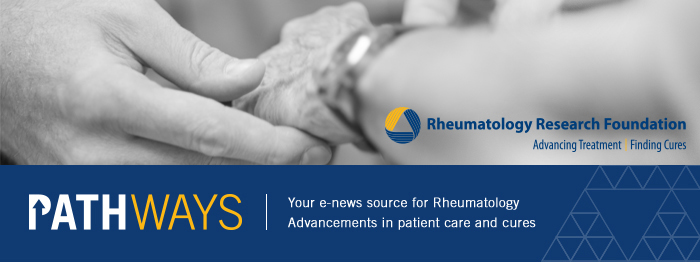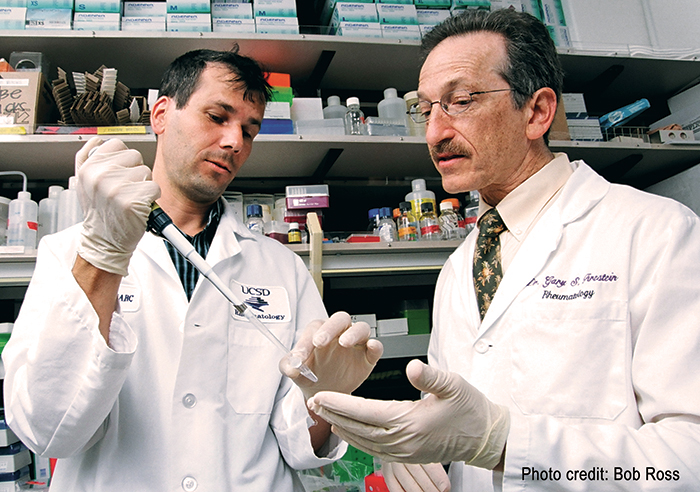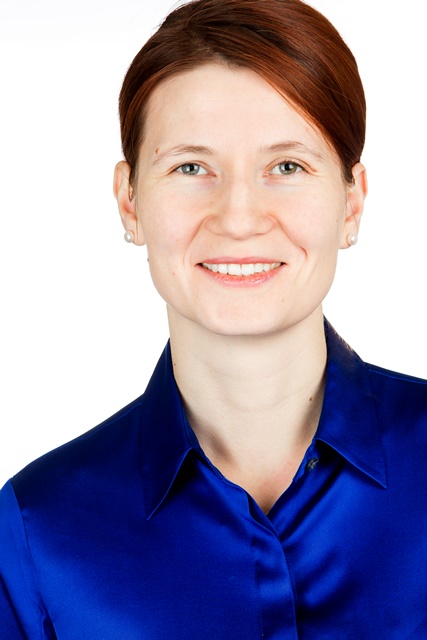Pathways

Volume 4 • Issue 7 • July 2015 • Rheumatology Research Foundation
Foundation Makes Latest Investment in Research and Training
The Rheumatology Research Foundation is awarding more than 80 grants to a wide range of trainees and professionals across the country in the field of rheumatology. The grants will fund essential education, training and research into arthritis and rheumatic diseases, which cause inflammation in a person’s joints and musculoskeletal system. More than 52 million adults in the U.S. have arthritis, and, in all, arthritis and rheumatic diseases are the number one cause of disability in the country, according to the Centers for Disease Control and Prevention.
In the coming fiscal year (July 1, 2015–June 30, 2016), the Foundation will fund an estimated 265 awards, totaling nearly $13.2 million, aimed at improving the health of people with rheumatic diseases. While some awards will support the education and training of future rheumatology professionals, others will fund innovative research projects that will lead to breakthroughs in treating people with rheumatic diseases.
One example is the Disease Targeted Research Pilot Grant, which encourages established investigators to begin tests of unique research ideas into rheumatoid arthritis and related autoinflammatory diseases by providing seed funds to gather preliminary data. Another award, the Career Development Bridge Funding Award: K Supplement, encourages junior investigators to expand promising research by providing additional support to cover research costs and help investigators become independent. Additionally, the Fellowship Training Awards support the training of future rheumatologists, doctors specially trained in the conditions, to provide a more robust and highly-trained workforce to care for people with rheumatic diseases.
For those affected by rheumatoid arthritis, lupus and other painful rheumatic diseases, supporting the Foundation is a way to invest in the future and impact the lives of patients. Steve Russell and his wife, Debra, began donating to the Foundation after their daughter was diagnosed with systemic juvenile idiopathic arthritis (sJIA) at just 16 years old. “I have seen the pain firsthand,” explains Steve, “and want to see others spared of this disease.”
Supporting the Foundation’s awards program also provides a powerful way for rheumatology professionals to give back to and help enhance their field. “As an award recipient, I know firsthand how funding from the Foundation can be integral to conducting novel research that will lead to important breakthroughs,” says Jon Giles, MD, MPH. “And as a donor, it’s an honor to help support and train the next generation of rheumatology professionals.”
Check out the exciting work being done by the latest recipients of Foundation funding.
This year marks the 30th anniversary of the Rheumatology Research Foundation! To celebrate 30 years of advancing treatment of rheumatic diseases, the Foundation will profile 30 people who have made a significant impact in the world of rheumatology through their work with the Foundation. Please feel free to email us if you would like to contribute a story about how the work of the Foundation has directly impacted your life, or if you would love an opportunity to share your story or brag about your rheumatologist. We would love to hear from you!
30 Over 30: Gary Firestein, MD

Gary Firestein, MD
|
Many years ago, Gary Firestein, MD, and a committee of other American College of Rheumatology members were tasked with researching the needs of young investigators and proposing new awards for the Rheumatology Research Foundation to help fill the often unavoidable gaps in funding felt by so many up-and-coming researchers. The committee proposed what is now known as the Investigator Award, which supports investigators conducting a wide range of research from molecular studies in the lab to patient interactions in the clinic. The Investigator award helps young rheumatology researchers build on their post-doctoral fellowship training to become established independent investigators. Now several years later, that very award has funded some of Dr. Firestein’s own trainees. According to him, it is “absolutely essential to bridge the gap from fellow to independent investigator.”
No one knows more than Dr. Firestein how important Foundation funding can be for conducting critical research – himself having been a recipient of Foundation-funded grants. As Dr. Firestein recounts, “Early in my career, I received a disease-specific award from the Foundation. The National Institutes of Health (NIH) hadn’t been very receptive because my research was risky – but the Foundation funded it. Since then, I’ve received at least four other awards, some from the NIH. Without the Foundation, it would have never made the jump from good idea – albeit risky – to the payoff: carving out a new area in the pathogenesis of RA.”
When asked why he supports the work of the Foundation, Dr. Firestein references his own first-hand experience, “The Foundation offers junior faculty the ability to survive in this difficult funding environment and invests in high-risk, high-yield projects that are too innovative for traditional funding sources. And that’s when breakthroughs happen.”
30 Over 30: Ana-Maria Orbai, MD, MHS

Ana-Maria Orbai, MD, MHS
|
Ana-Maria Orbai, MD, MHS, is an Instructor in Medicine in the Division of Rheumatology at the Johns Hopkins University School of Medicine. Beginning in her fellowship, Dr. Orbai focused on research projects to improve patient outcomes. Dr. Orbai reflects on why she chose rheumatology, how the Foundation has supported young investigators and why research focused on patient outcomes is so important.
Q: Why rheumatology?
A: I found rheumatology so interesting because of its complexity and focus on many systems. I love that interaction of looking at a whole person and their immune system. Working on that puzzle is particularly intriguing and challenging. I pursued research because that’s how you can really make an impact, besides treating patients, of course. Currently, I’m working on qualitative research to understand quality of life issues among patients with psoriatic arthritis. We’re trying to build a strong measure of reasonable treatment targets for these patients, which we don’t have right now.
Q: How did you first hear about the Foundation’s grant opportunities?
A: My mentor at Hopkins first introduced me to these opportunities, and I remember seeing other young colleagues of mine launch their careers with Foundation support during their fellowships. The mentoring relationship is extremely important because it gives you that scientific support and certainly develops your skills, but it’s also so important in helping you find resources so you can stand on your own two feet as a young investigator.
Q: What did receiving a grant mean to you and your career?
A: It really launched my career as a physician scientist. Funds for young investigators are shrinking and it’s almost impossible to get a K grant from the National Institutes of Health (NIH) when you’re young. The Foundation offers a chance for young scientists to be involved in academia. It’s like a spring for a young person growing into his or her career as a scientist, and we need a supply of young people pursuing academia. This is a great way to fill that void.
Q: What is the greatest impact you’ve seen the Foundation make in the last 30 years?
A: I think the greatest impact has been funding for early career development. It’s so important to advance research that can be applied to patients and make a positive impact on their lives.
Q: What do you hope to see the Foundation achieve over the next 30 years?
A: I would like to see the Foundation maintain this direction and focus on early career development and giving young scientists a chance to launch their career. My work is on patient-focused clinical research, and it’s particularly difficult to find grants for that work. I would love to see more patient-centered research. It’s so important to go back to the patient and see what’s really important and what the real impact is for them.